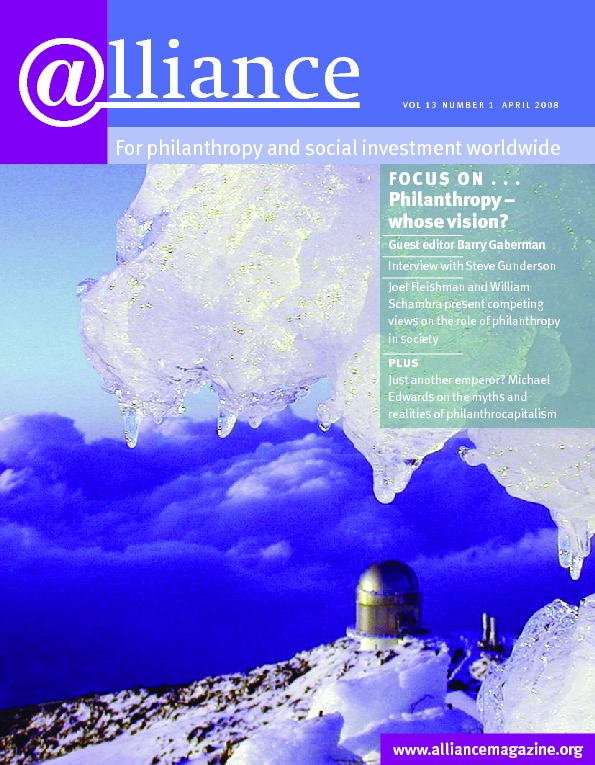At first glance a man who wears a cheap watch, uses a plastic bag full of books as carry-on luggage and insists on flying economy is not your usual billionaire – or philanthropist. Chuck Feeney’s humble character and his vision for a better world through fostering leadership are the ingredients of this unique story by Conor O’Clery. His biography of Chuck Feeney gives an insight into the work of one of the most successful entrepreneurs and philanthropists of our time. It shows that by finding and trusting in the right people and continuous learning from experience one can ‘move mountains’.
Feeney and his three business partners in the 1960s built up one of the largest retail businesses in the world, Duty Free Shoppers (DFS). When Feeney sold his share in the company in 1996 he pocketed more than $1.6 billion. What nobody knew at that time was that Feeney had signed off the core of his funds into a foundation, Atlantic Philanthropies, 12 years earlier. This foundation worked until the end of the 1990s, mainly in secrecy. Among grant recipients around the world Feeney and his foundation were known only as ‘anonymous’.
The other novelty about Feeney’s way of giving is that in 1999 he decided to spend down Atlantic Philanthropies funds by 2016 – in order to stay in control of what happens to the money as well as to witness the impact his donations will have. Conor O’Clery estimates that by the time Atlantic ceases to exist, the foundation will have invested more than $12 billion in charities. Since the foundation is registered in the tax haven of Bermuda and because of extremely successful investments, spending down often means a crazy race against the rapidly increasing returns Atlantic manages to achieve.
Feeney’s way of doing philanthropy is closely connected with his way of doing business. DFS’s business model was based on setting up shop in duty-free havens around the world and luring the growing number of international travellers there to buy luxury goods. Most of his business activities were kept secret as long as possible so that competitors would not copy ideas. This way of doing business and the fact that Feeney worked in intelligence for the US Airforce at the end of the 1940s are indicative of the urge for secrecy behind all his actions.
During his travels, Chuck Feeney would also identify philanthropic ventures to invest in. Luck, a sixth sense, a nose for leadership, the analysis of facts, advice from friends and a startling interest in world affairs guided him as a donor, particularly in the USA, Ireland, Australia, Vietnam and South Africa. In the end this proved to be the same mixture of qualities that ensured the success of his business. Feeney’s success very much depended on the people he invested in. Characteristically, he would question prospective grantees in detail before making any grants.
The Billionaire Who Wasn’t describes how Feeney’s philosophy of philanthropy developed and what obstacles his foundation had to overcome. As an active philanthropist, Feeney gave, and gives, not only money but also time, passion and a personal commitment to the causes Atlantic Philanthropies supports.
The biography shows how Atlantic Philanthropies developed into a highly professional foundation with a clear and focused strategy. It illustrates some of the challenges inherent in managing a large foundation and describes how the foundation ended up narrowing its focus to investing in just four major programme areas in the last decade of its existence.
However, the reasons why Feeney was so reluctant to go public with his philanthropic work and decided to spend down the money of the foundation can hardly be understood without learning more about him as a person. Feeney is presented as a naturally modest man. The book develops leitmotifs for his actions that are rooted in his own upbringing. He was raised in the close-knit Irish-American community of Elizabeth, New Jersey, where his mother tried to help people without others knowing about it. Conor O’Clery presents Chuck Feeney himself, a father of five children, as a passionate family man who intuitively found ways to teach his children to focus their lives beyond wealth.
With this authorized biography the secret of Chuck Feeney is no longer a secret. In an interview in September 2007, he said ‘I’m not getting younger, I don’t think. And I feel like there might be some advantage to spreading the word about giving while living and the satisfaction that people get from giving, and see if anybody agrees’. Many will.
Felicitas von Peter is Managing Partner, Forum for Active Philanthropy, and Michael Alberg-Seberich is Executive Partner. Emails alberg-seberich@activephilanthropy.org and fvonpeter@activephilanthropy.org
The Billionaire Who Wasn’t: How Chuck Feeney secretly made and gave away a fortune – Conor O’Clery
Public Affairs $26.95
ISBN 9781586483913
To order
http://www.publicaffairsbooks.com






Comments (0)